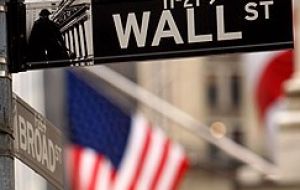MercoPress. South Atlantic News Agency
Argentina faces complicated horizon, says Wall Street

Wall Street analysts forecast a complicated horizon for Argentina fueled by the government's political problems, slower economy, rising inflation and the ongoing dispute with farmers over taxes which some anticipate will find its way to the courts, according to reports in the Buenos Aires press.
Merrill Lynch, Barclay's and Crédit Suisse are recommending their clients to get rid of their assets in Argentine pesos, since they estimate that sooner or later the Argentine Central Bank will have to yield in the dispute over the US dollar in the local money market. According to a survey from Bloomberg, a majority of analysts believe the US dollar will be costing 3.20 Argentine pesos at the end of the year from its current 3.05. But the main fear of analysts is a continuation of the current economic policies which could lead to a crisis "comparable to that of 2001/02", when the Argentine economy melted, unless there is a massive correction of economic indexes (such as retail inflation), elimination of subsidies (mainly energy and transport) and increase in public utilities rates, among other issues to address. According to economic advisors Ecolatina, energy and food subsidies last year absorbed over seven billion US dollars and in 2008, with international values soaring, could jump to fourteen billion US dollars. Therefore the urgency to begin collecting the sliding export taxes on grains and oilseeds from farmers. According to press reports in Argentina the bill to import diesel, natural gas and electricity is costing the Treasury 320 million US dollars per week, mainly because of the mismatch between international prices and subsidized home bills. Manipulation of the Statistics Office, Indec, has enabled the Kirchner administrations to save hundreds of millions of US dollars on interest payments on sovereign bonds linked to inflation and Argentina's economic growth. But this coarse approach to "wishful accounting" has scared investors who turned to other markets. Even when government officials insist inflation is still below the two digits, the private sector estimates range between 25 and 30% for this year. Buenos Aires City mayor Mauricio Macri recently back from China said town hall plans to float a 500 million US dollars bond to uplift the city has been frustrated because of lack of investors interest, fearful of the Argentine political situation. However Wall Street analysts also point out to "the lack of leadership" in Argentina, which is essential before addressing any financial or economic issue. They further argue that "the camp strike will lag on" and anticipate a drastic deceleration of the Argentine economy and speeding of inflation if government continues to overspend at the current rate. Merril Lynch at the end of May, in the midst of the farmers' dispute, downgraded Argentina's growth forecast for this year to 6.8%, the lowest since the country's full steam recovery of 2002. It estimates the exchange rate at 3.25 pesos to the US dollar by the end of 2008. Eurasia Group, a consultant on political risks with many banking clients in Wall Street and Europe believes that the confrontation between farmers and the government has led to an "enormous" loss of power and influence for the Kirchners. But it's not only farmers, one of the latest chapters is the split of the all powerful labor unions movement in Argentina. "On balance the Argentine government will loose with the split of the labor movement since this only generates further uncertainty about wage increases further complicating efforts to contain inflation", according to Eurasia. Argentina also has as adverse situation in international financial markets. It still has hold outs of 20 billion US dollars which did not participate in the re-scheduling of its defaulted sovereign debt; it has pending debts with the Paris Club which limits access to soft loans and this year must pay 6.5 billion US dollars in interests and 14.6 billion next year. The only creditor of last resort for Argentina currently is Venezuela's Hugo Chavez. Nevertheless Argentina's Central Bank has over 50 billion US dollars in international reserves.




Top Comments
Disclaimer & comment rulesCommenting for this story is now closed.
If you have a Facebook account, become a fan and comment on our Facebook Page!